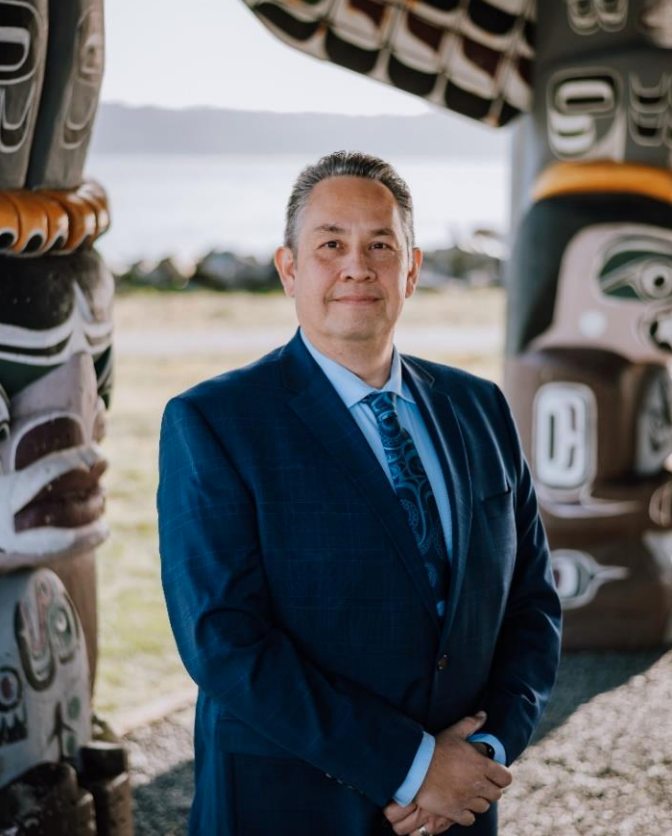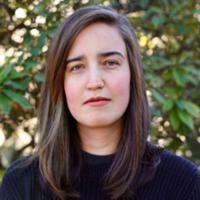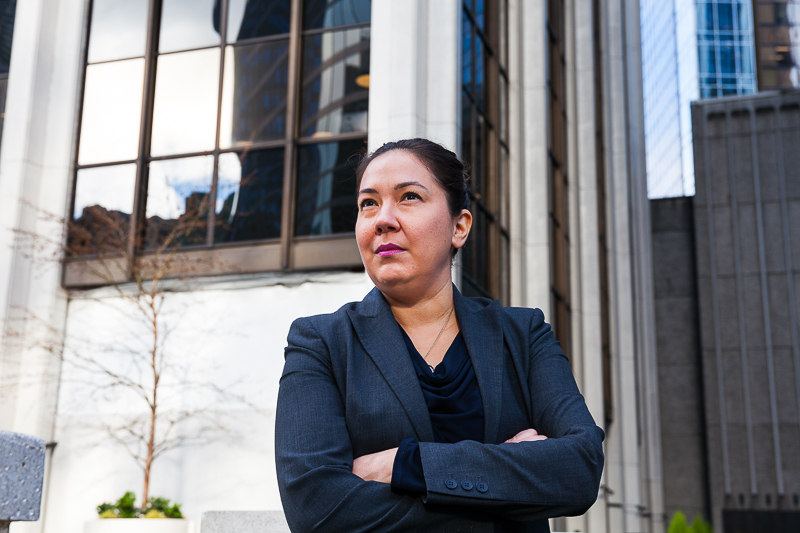Katrina Harry clearly remembers the moment she found her calling in the legal field. She had been practicing for a couple of years in Aboriginal and general law when she was asked to take on a child protection matter for Legal Aid BC.
The case involved helping a young Indigenous woman who’d had her newborn child removed shortly after birth.
“It’s a common story. We still see headlines about these kinds of stories. It really struck a nerve with me,” says Harry over the phone from her Vancouver home.
A mother to her own young children at the time, Harry, who is Shuswap from Esk’etemc First Nation near Williams Lake, remembers feeling a passion instantly ignited.
“The fact that I could work with Indigenous clients, clients that were marginalized, that were in poverty, that were facing involvement with social workers. That I could support them and explain the system and help them feel empowered through education and understanding their rights and responsibilities....”
It made the decision to shift her practice focus an easy one. “The area of child protection spoke to me very quickly, and I gravitated towards it after that first case,” she says.
Since then, Harry has spent the last decade-and-a-half advocating for parents, children and families in the legal system, and setting up the first Parents Legal Centre in B.C. She now manages 10 different family legal centres across the province and is the manager of Indigenous services at Legal Aid BC.
She is also one of four Indigenous lawyers running in a co-ordinated effort for the position of bencher in the upcoming Law Society of BC elections — a historic moment that may just open up the legal profession to more equity and accountability, experts say.
What benchers do
Benchers are the governors of the law society, serving as a board that helps to oversee the legal profession in the province and address matters of legal education, disciplinary actions and protection of the public interest in client-lawyer relations.
Nineteen of the 25 positions are elected by other lawyers (the other six are appointed by the provincial government, and do not need to be legal professionals), and each bencher serves a minimum two-year term in the role.
Since the law society’s creation in 1869, there have only been two self-identified Indigenous benchers elected to the benchers’ table. The second is ending her three-year term this winter.
Karen Snowshoe, a prominent lawyer from the Teetl’it Gwich’in First Nation and former senior counsel for the National Inquiry into Missing and Murdered Indigenous Women and Girls, was the first Indigenous woman elected as bencher in 2018.
During her term, Snowshoe led several important initiatives, including the establishment of a regulatory review task force charged with investigating how disciplinary processes can be more respectful of Indigenous complainants and witnesses.
The committee was established after a controversial disciplinary decision involving a B.C. lawyer who hired and continued to work with an Indigenous man who was allegedly extorting money from members of the Tŝilhqot'in Nation.
“I found a lot of inspiration in learning from Karen Snowshoe about the role that she’s had over the last three years,” says Harry. “I was very encouraged by the type of experience and wisdom that she brought to [the role], being an Indigenous woman.”
Harry says she was also inspired to run for bencher by the work of other Indigenous lawyers across B.C. who are making important contributions to the field through their volunteerism, community work and advocacy for Indigenous clients.
“I really feel that it’s so important — the time is now — to continue to have that Indigenous voice at the bencher table,” she says. “When I heard that Karen was leaving, I wanted to make sure that I was going to be able to at least put myself forward to carry on some of the ongoing work that the law society has been engaging in.”
Harry is joined by lawyers Kelly Russ of the Haida Nation, who is running in Vancouver; Brian Dybwad of the Gitxsan Nation, who is running in Nanaimo; and Lindsay LeBlanc of the Métis Nation, who is running in Victoria.
The four are running in a slate supported by the Aboriginal Lawyers Forum, a division of the Canadian Bar Association. Two other Métis candidates, Georges Rivard and Kyla Lee, are also running.
The voting period, which opened Nov. 1, closes today, before votes are counted on Tuesday, Nov. 16.
A long history of exclusion
In 2015, the Truth and Reconciliation Commission released its report denouncing the Canadian government’s treatment of Indigenous peoples and the legal system’s role in supporting cultural genocide. Since then, the legal profession, along with other institutions across the country, has made efforts to address the report’s calls to action.
In 2016, the B.C. law society created a Truth and Reconciliation action committee to engage Indigenous leaders on best practices for the profession moving forward. In 2018, benchers approved an action plan that included an Indigenous intercultural competency course that was piloted this September. The course will be mandatory for all practicing lawyers in B.C. The following year, in 2019, B.C. became the first province in Canada to ratify and pass into law the United Nations Declaration on the Rights of Indigenous Peoples.
Yet for all these supposed efforts at reconciliation, a long history of exclusion of Indigenous people in the Canadian legal system has made it difficult to enact meaningful change.
Bruce McIvor, a Métis lawyer and adjunct professor at UBC who specializes in constitutional law and Aboriginal treaty rights, says it comes down to several things. One is a general lack of understanding about the constitutional rights of Indigenous peoples, and often a lack of respect for Indigenous legal traditions and practices. And another is simply the lack of Indigenous representation in regulatory positions across the field.
“I think they are gradually moving in that direction,” says McIvor of addressing historical wrongs, “but part of the challenge has been that there have not been sufficient numbers of Indigenous people around the table involved in making decisions about how that is going to be done.”
He notes that it has been an ongoing problem across Canada, not just in B.C. or in the law society.
“I don’t think there’s much doubt that there is systemic racism in the legal profession. Entry into the profession, being qualified as a lawyer — this has always been an obstacle for many Indigenous people. And once you’re in the profession, as a lot of my colleagues have observed, there’s a lot of barriers still, to advancing and having a successful career. And Indigenous lawyers face their own challenges, particular visibly identifiable Indigenous lawyers.”
For McIvor, law societies have an essential role to play in rectifying this.
“It’s important that it’s not simply recognized by the law society, but that there are active measures and concrete deliverables to ensure that these barriers are taken down. At the end of the day, it’s important that the legal profession properly reflects the makeup of the province as a whole,” he notes.
It’s one reason he feels hopeful about the upcoming B.C. bencher election.
“We’ve only had one Indigenous bencher to date. If meaningful change is to occur, there needs to be multiple Indigenous voices around the table. You can’t just rely on one Indigenous person,” he says.
Jason Kuzminski, director of communications and engagement at the law society, noted in an email that part of the society’s 2018 Truth and Reconciliation action plan includes active recruitment of Indigenous benchers, committee members and staff.
“The number of Indigenous candidates putting their names forward to become a member of the governing board of benchers is encouraging,” he said. “It is consistent with efforts the law society has been making to foster diversity and be more inclusive of Indigenous peoples in our governance and how we regulate the legal profession in the public interest.”
He also noted that the law society asks the B.C. government to select at least one Indigenous individual for appointment to the public representatives of the board of benchers each term.
‘Representation matters’
Brian Dybwad is a Hereditary Chief of the Gitxsan Nation and the managing lawyer at the Parents Legal Centre in Campbell River. Like Katrina Harry, he practices in child protection law, and sees many Indigenous clients come through the doors of the legal centre.
He felt encouraged to put his name forward for the bencher election when he saw that the law society was looking to increase diversity, equity and inclusion. He had also been reflecting in recent months on the increased visibility of Indigenous issues in the public conversation.

“It really got me thinking about where we sit, currently. When you look at where the protection of the public interest comes into play, the legal profession and legal professionals should be able to reflect the population that [is] being served,” he says. He feels encouraged by the other individuals who are putting their names forward.
“I look at the history of having Indigenous benchers at the bencher table — most recently we’ve had Karen Snowshoe, who blazed a trail, and was able to come forward with a lot of inspiration for those of us who are running for candidates in this upcoming election. One of the big pieces that she got off the ground was the regulatory review task force. That type of work certainly interests me,” he says.
Dybwad is also interested in promoting mental health care in the legal profession, something he believes has become an increasingly important issue over the pandemic.
“I look at the mental health issues that a lot of lawyers are facing: sole practitioners in small communities are under a lot of pressure. Even lawyers that are in established law firms… there’s a lot of pressure that has come from the COVID-19 pandemic; questions like, ‘Can I even see my clients in person?’ You lose all the different aspects of the dynamic of practice when you’re only speaking to a person via telephone or video or through a glass.”
He feels hopeful about some of the initiatives the law society has taken on in recent years to make the law profession more equitable for legal professionals, and excited about the possibility of contributing to them. As an Indigenous lawyer, he also hopes to pave the way for others to follow in his footsteps.
Harry feels the same.
“We need to support and encourage young Indigenous lawyers to make the legal profession their home, so that they are staying in the profession — we are retaining them — and they are finding their passion,” she says.
“It’s just really an important moment in history that we’re able to advocate to have Indigenous voices in the body that governs lawyers in the province. Even if I don’t win,” says Harry, “I’m hoping that I inspire other people who might not have otherwise run for bencher to do the same. Representation matters.” ![]()
Read more: Indigenous, Rights + Justice
















Tyee Commenting Guidelines
Comments that violate guidelines risk being deleted, and violations may result in a temporary or permanent user ban. Maintain the spirit of good conversation to stay in the discussion.
*Please note The Tyee is not a forum for spreading misinformation about COVID-19, denying its existence or minimizing its risk to public health.
Do:
Do not: